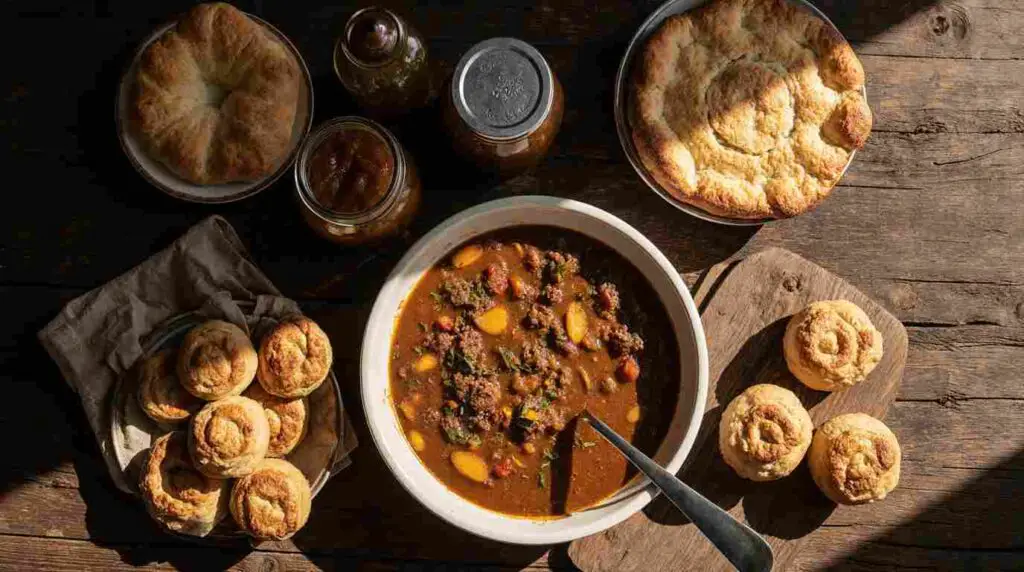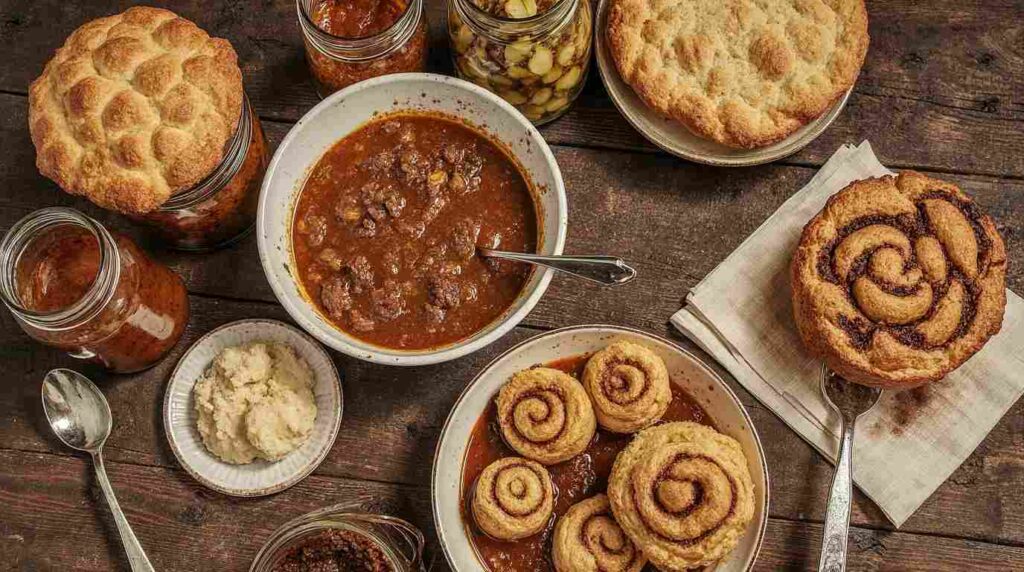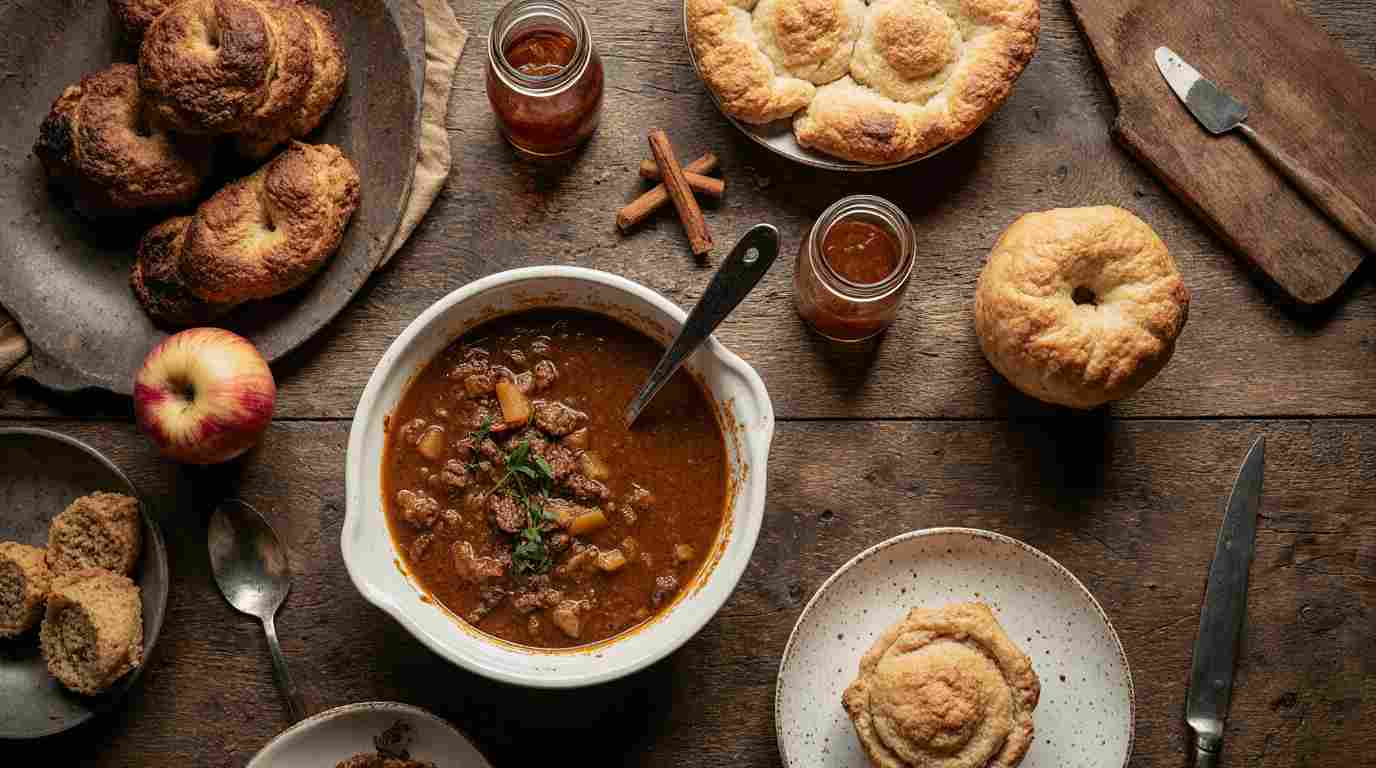Amish recipes are more than just food, they’re a reflection of a simple, tradition-rich way of life. Whether you’re craving a bowl of comforting chicken corn soup or a slice of homemade apple fritter bread, Amish cooking brings the flavors of the countryside to your kitchen. In this guide, we explore the best Amish recipes, organized by category to help you discover your next favorite dish.
Jump To :
Who Are the Amish?
The Amish are a religious community known for their plain dress, simple living, and resistance to modern technology. Most Amish communities are found in the United States, especially in Pennsylvania, Ohio, and Indiana.
Food plays a central role in Amish life. Recipes are passed down through generations and often cooked using fresh, seasonal ingredients. Meals are homemade, unprocessed, and centered around family gatherings and community values.
If you’re new here, be sure to explore the full Pinterest of Amish recipes to get a true taste of Amish tradition.
Why Are Amish Recipes So Popular?
Amish recipes have stood the test of time for a reason. They’re:
- Simple to prepare
- Made with wholesome, real ingredients
- Rich in flavor and nostalgia
- Perfect for feeding a family or large gathering
From warm soups on a cold winter day to fluffy cinnamon rolls baked fresh for Sunday mornings, Amish food delivers comfort in every bite.
The Categories of Amish Recipes
Amish cooking includes a wide variety of dishes. Let’s break them down into their most popular categories:

Hearty Amish Soups
Amish soups are famous for being nutritious and satisfying. They often feature home-raised chicken, noodles, root vegetables, and herbs.
Popular soup recipes include:
- The classic Amish Penicillin Soup, known for its immune-boosting properties
- The comforting Amish Chicken Corn Soup, a favorite for family dinners
- The warming Amish Winter Soup, perfect for chilly evenings
- The creamy and unique Amish Milk Soup
- Traditional Amish Church Soup, often served at community gatherings
- The mysterious and hearty Amish Gma Soup
- Surprisingly delightful Amish Coffee Soup
- For a great variety, check out the Top 7 Amish Soup Recipes
These soups provide warmth, nutrition, and a glimpse into Amish culture.
Classic Amish Main Dishes
Main courses in Amish cooking are rich, filling, and made to satisfy hungry families after a long day of work.
Must-try recipes include:
- The hearty and flavorful Amish Beef Stew Recipe
- The family favorite Amish Hamburger Steak Bake, perfect for weeknight dinners
- The simple yet delicious Amish Poor Man’s Steak
- The comforting Amish Country Casserole, a staple for gatherings
- The unique and tasty Amish Chicken and Waffles, a twist on a classic comfort food
These dishes represent the hearty, practical cooking that Amish families rely on.
Delicious Amish Desserts & Baked Goods
One of the most beloved aspects of Amish cooking is their incredible desserts. They bake using time-tested methods and ingredients like apples, cinnamon, molasses, and buttermilk.
Try these irresistible treats:
- Soft and sweet Amish Cinnamon Rolls
- The cozy Amish Cinnamon Bread
- The classic Amish Apple Cake Recipe
- Moist and flavorful Amish Applesauce Cake Recipe
- The indulgent Amish Chocolate Whoopie Pies
- The timeless Amish Apple Pie Recipe
- The tasty Amish Apple Fritter Bread Recipe, great for breakfast or snacks
These desserts perfectly round out any Amish meal and are sure to impress.
Amish Side Dishes, Salads & Pickles
Side dishes in Amish cuisine are simple yet flavorful, often based on fresh produce and traditional preservation techniques.
Don’t miss:
- The refreshing Amish Cucumber Salad
- The tangy and crunchy Chow Chow Recipe, a pickled vegetable favorite
- Crispy Amish Onion Fritters that pair well with any meal
These sides balance heavier dishes and bring freshness to the table.
Natural Remedies & Traditional Recipes
Some Amish recipes go beyond the kitchen and into natural health remedies.
A fascinating example is the Amish Amoxicillin Natural Remedy, a homemade concoction used to support the immune system, inspired by traditional Amish wisdom.
History and Origins of Amish Cooking

How Amish Culinary Traditions Began
Amish cooking traditions trace back to the 16th and 17th centuries in Europe, when the Amish community, part of the Anabaptist movement, fled persecution. They brought with them simple, hearty recipes based on locally available ingredients. When settling in Pennsylvania, these recipes adapted to New World foods, turning rye bread into cornbread, root vegetables into stews, and wild fruits into preserves.
Influence of Rural Life on Ingredients
Living off the land meant relying on fresh eggs, milk straight from the farm, seasonal vegetables, and home-cured meats. This lifestyle shaped dishes like Amish beef stew and Amish church soup, which were designed to feed large families using minimal waste.
Essential Ingredients in Amish Recipes
Fresh, Local, and Unprocessed Foods
Amish recipes avoid canned or processed goods, instead focusing on fresh ingredients grown or raised locally. Using fresh eggs, freshly milled flour, butter, and seasonal produce results in healthier, more authentic flavors.
Simple Spices and Herbs
Amish cooking uses a small set of herbs such as parsley, sage, and thyme, and spices like cinnamon and nutmeg. This simplicity lets the main ingredients shine, whether it’s the warm cinnamon scent in Amish cinnamon rolls or the gentle herbal aroma in chicken corn soup.
Tips for Cooking Amish Recipes at Home
Traditional Tools vs. Modern Kitchen Gadgets
Amish cooks use cast-iron skillets, Dutch ovens, and hand-crank tools. You can recreate their dishes using your own kitchen tools—like a heavy pot for soups and loaf pans for cakes—but it’s important to cook slowly to develop rich, deep flavors.
Storing and Preserving Amish Style
Preserving food through canning, pickling, and cold storage is common. After making items like apple butter, sealing them in sterilized jars allows you to enjoy these flavors all year round. Pickled vegetables and relishes can stay fresh for months and add brightness to any meal.
Health Benefits of Amish Cooking
Whole Foods and Minimal Processing
Amish recipes use natural ingredients without preservatives or artificial additives, preserving vitamins and nutrients. Soups made with garlic, onions, and homemade broth offer natural immune-boosting properties.
Balanced Family Meals
Dishes often combine meat, grains, and vegetables in one pot, providing a balanced meal with protein, fiber, and carbohydrates. This approach supports steady energy and fullness without excess calories.
Celebratory Occasions and Amish Food
Religious and Community Gatherings
At church suppers and barn raisings, large dishes like hearty soups and casseroles are served to feed dozens, emphasizing sharing and community spirit.
Family Milestones and Holidays
Special occasions like Thanksgiving often feature apple pies and onion fritters, while birthdays are celebrated with sweet treats such as chocolate whoopie pies.
Amish Recipes for Kids and Families
Quick and Kid-Friendly Meals
When time is limited, dishes like “Poor Man’s Steak” or cinnamon bread are easy to prepare and popular with children due to their mild flavors and fun textures.
Nutritious Twists on Classic Recipes
You can add vegetables like shredded zucchini into applesauce cake or extra veggies into chicken and waffles to boost nutrition without losing the traditional taste.
Final Thoughts: Why Amish Recipes Matter
Amish recipes aren’t just about eating , they’re about connecting to a simpler, slower, and more meaningful way of life. Whether you’re cooking for your family, learning about traditional foods, or just exploring new flavors, Amish cuisine offers something for everyone.
Ready to dive deeper? Visit the full Amish recipes collection to discover more authentic dishes, step-by-step instructions, and the rich heritage behind every bite.
Frequently Asked Questions about Amish Recipes
What makes Amish recipes different from other American recipes?
Amish recipes stand out because they focus on simple, wholesome ingredients sourced locally or from home gardens. They avoid processed foods and emphasize traditional cooking methods passed down through generations, resulting in hearty, nutritious meals.
Are Amish recipes healthy?
Yes, Amish recipes are generally healthy because they use fresh, natural ingredients without preservatives or artificial additives. Many dishes feature vegetables, whole grains, and lean proteins, making them nutritious options for families.
Can I make Amish recipes with modern kitchen tools?
Absolutely! While Amish cooks traditionally use cast-iron skillets and Dutch ovens, you can easily prepare Amish dishes using regular pots, pans, and ovens. The key is to cook slowly and with care to develop rich flavors.
How can I preserve Amish-style foods at home?
Preserving methods like canning, pickling, and storing in cool, dark places are commonly used in Amish cooking. You can apply these techniques to jams, pickled vegetables, and sauces to enjoy Amish flavors year-round.
What are some popular Amish soups to try?
Popular Amish soups include hearty beef stew, chicken corn soup, and the famous “Amish Penicillin Soup,” which is known for its comforting, immune-boosting ingredients like garlic and onions.
Are Amish desserts easy to bake for beginners?
Many Amish desserts, such as apple cake, cinnamon rolls, and whoopie pies, have straightforward recipes that are perfect for beginner bakers. They rely on basic ingredients and simple techniques, making them accessible and delicious.

